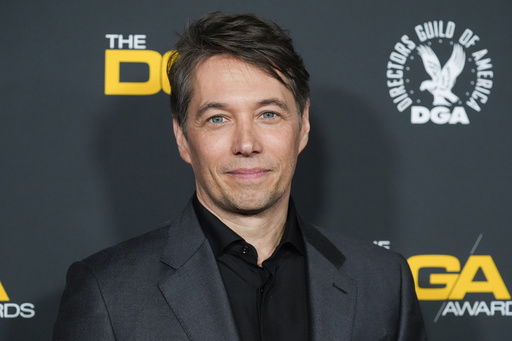Sean Baker reflects on becoming a ‘weird spokesperson’ for theatergoing

By KRYSTA FAURIA
Associated Press
LOS ANGELES (AP) — During his best director acceptance speech at this year’s Academy Awards, Sean Baker zealously spoke about the importance of theatergoing, particularly the increasingly threatened independently-owned cinemas. Baker was accepting the award for “Anora,” which won five of the six Oscars it was nominated for that night.
On the other side of that awards campaign, the independent filmmaker is continuing his evangelism for seeing films on the big screen by teaming up with Pluto TV for “Free Movie Weekend,” which highlights independent and family-owned theaters across the country throughout the summer, including the Music Box Theatre in Chicago this weekend.
The initiative kicked off with Baker’s pick near Los Angeles — the Gardena Cinema. Complimentary tickets will also be offered to the Colonial Theatre in Phoenixville, Pennsylvania, as well as Detroit’s Redford Theater in the coming weeks.
In an exclusive interview, Baker spoke with The Associated Press about why he feels like a “weird spokesperson” for theatergoing and how he hopes his next film will differ from his previous work. The interview has been edited for clarity and brevity.
AP: You are an outspoken advocate for independent and family-owned movie theaters. Why are they so important to you?
BAKER: I’m Gen X. Growing up, the theaters that we primarily went to were independently owned and usually family owned. Multiplexes kicked in in the late 80s. I love multiplexes. They’re great, but there is something that’s a little more intimate and has that family warmth. It’s not a corporate environment. For a very long time, that’s how I discovered and fell in love with the movies.
And then I actually worked in an independently-owned theater. It was the craziest thing. It was called the Roberts Cinema in New Jersey, and I applied for a job as the ticket ripper. It was a small business, so next thing you know, they are training me on the projectors. Next thing, they’re like, “We need a manager.” So, at 17 years old, I was managing, projecting and ticket ripping at a theater in Manville, New Jersey, that’s no longer there. They played mostly Disney films during the day and foreign films at night. It was my first real job and I look back fondly on that time.
And then I went to film school and I started making movies. It’s always been with the intention of making feature films for theaters. A dream of mine is to someday maybe even own a theater.
AP: I think there are a lot of people who think big movies with big movie stars are the secret to getting people into theaters.
BAKER: That’s something that I’ve been personally battling with. I am preaching that this sort of entertainment is meant first and foremost for theaters, so come out and see them. And then at the same time, I make films that are a little bit difficult and not exactly friendly for a wide audience. But I hope that, since my films lean into a little more into that prestige world, maybe people will come out looking for that sort of thing. “This film won the Palme d’Or and then eventually an Academy Award. Maybe this is something we should see in the theater, even though it doesn’t fit the mold of what we normally are going to see, which are the blockbuster popcorn movies.” Those are the movies that keep cinemas alive, not my films. Maybe someday. But it’s the “Barbies” that are keeping the cinemas alive, not the “Anoras,” even though “Anora” did amazingly well in the hands of Neon. I do sometimes feel like a weird spokesperson for this because I’m not exactly delivering what I’m preaching on.
AP: The Oscars this year were sort of like a PSA for theatergoing. I wonder if you subscribe to the idea that that message would be received better if the Academy recognized movies like “Wicked” or “Dune: Part Two” more.
BAKER: They do. I mean, those films were nominated. But maybe. Maybe we do need that one extra category for box office success. Why not celebrate that too? I mean that’s something that other awards shows around the world celebrate and there’s no reason not to celebrate when a film hits the zeitgeist. That’s an important cultural milestone. So why not celebrate that publicly? That’s what the Oscars are for in many ways.
AP: We’ve talked before about the success of “Anora” and how you are thinking about how it will inform your next film.
BAKER: I think the new thing that I’m dealing with is just the pressure of how do I follow up ”Anora?” I don’t want to disappoint people, but I want to give something a little new and different. It’s just scary. I don’t know how else to say it. I just woke up. It’s scary. But hopefully I’m working with the same people again, not only making the film, but also distributing the film. And hopefully we make another film that connects.
My favorite filmmakers are filmmakers that do mix it up. They stay in their wheelhouse because that’s their voice. But there’s always a new thing. And hopefully my new thing is just leaning a little more into comedy. For a long time, I’ve made films that I would consider to be dramas or tragedies with comedic elements and I kind of want to push it into the comedy with dramatic or tragic elements. That might be my change.




